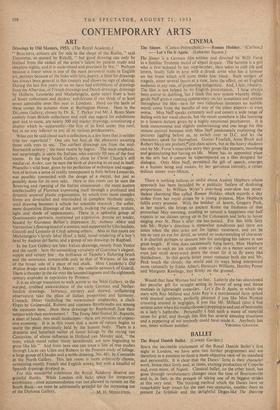CINEMA
The Sinner. (Cameo-Polytechnic.)—Roman Holiday. (Carlton.) —Let's Do It Again. (Leicester Square.)
The Sinner is a German film written and directed by Willi Forst in a familiar Teutonic mood of abject despair. The heroine is a girl who is first seduced by her step-brother, then takes to café life and lovers, finally falls in love with a drunk artist who has a tumour on the brain which will soon make him blind. Such wedges of tragedy, eaten several layers at a time, have the effect, on an English audience at any rate, of promoting indigestion. And, I fear, ribaldry. The film is not helped by its English presentation. I have always been averse to dubbing, but I think this new system whereby Hilde- garde Neff gives a running commentary on her sensations and actions throughout the film—save for two ridiculous instances no audible words come from the mouths of any of the other players—is even worse. Miss Neff speaks extremely well and covers a wide range of feeling with her vocal chords, but the result somehow is like listening to a lantern lecture given by a highly emotional psychiatrist. It is both monotonous and slightly embarrassing and one longs for this remote control business with Miss Neff passionately explaining the pictures jiggling before us, to switch over to D.C. and let the characters speak for themselves. Gustav Froelich, Anne Bruck and Robert Meyn are probablrarst class actors, but in the heavy shadows cast by Mr. Forst's miserable story they grope like puppets, mouthing and gesticulating but having no life. Mime has its appointed place in the arts but it cannot be superimposed on a film designed for dialogue. Only Miss Neff, permitted the, gift of speech, emerges as a human being and makes, by her garrulous intensity, a rather
tedious sinner over-lifesize. *• There is nothing tedious or sinful about. Audrey Hepburn whose approach has been heralded by a publicity fanfare of deafening proportions. In William Wyler's over-long over-slow but never- theless charming film called Roman Holiday, which records a day stolen •from her royal duties by a young princess, Miss Hepburn fulfils every promise. With the breaker of hearts, Gregory Peck, as her squire, she brings to ancient Rome the freshness of that proverbial May morning, exuding so natural a happiness one half expects to see daisies spring up in the Colosseum and larks to hover singing over St. Peter's after she has passed. For this little fairy tale Mr. Wyler's direction is somewhat ponderous and there are times when the plot cries out for lighter treatment, and yet he has so sure an eye for detail, so sound an understanding of character it is churlish perhaps to censure him for indulging his talents at too great length. If time, does occasionally hang heavy, Miss Hepburn has only to suck an ice cream cone or ride on a motor scooter or even just stroll dewy-eyed down the street for it to fly away like thistledown. In this gentle bitter sweet romance both she and Mr. Peck touch the clouds, the world and its ways being interpreted more rationally by Eddie Albert, Harcourt Williams, Hartley Power and Margaret Rawlings, feet firmly on the ground.
Would that Jane Wyman had no feet. Latterly she has abandoned her peculiar gift for straight acting in favour of song and dance routines in lightweight comedies. Let's Do It Again, in which she stars with Ray Milland and Aldo Ray is a matrimonial farce spiked with musical numbers, perfectly pleasant if you like Miss Wyman crooning around in negligees, if you like Mr. Milland (also a fine serious actor when his studio chooses) popping in and out of bedrooms in a lady's bathrobe. Personally I find such a waste of material cause for grief, and though this film has several amusing situations and a peppering of wit anybody could have made it. Anybody has


























 Previous page
Previous page